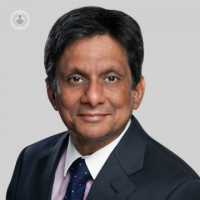Should I be concerned about breast lumps?
Written by:Finding a breast lump is a worrying and stressful experience for any woman. Renowned consultant breast and oncoplastic surgeon Mr Debashis Ghosh is here to answer any questions and concerns you may have about them.
What are the most common causes of breast lump?
Breast lumps are usually caused by something that is not cancer. You may have a breast cyst, you can have thickening of your breast tissue (which we commonly refer to as fibroadenoma) and you can also have fibrosis.

Usually one out of every fifteen patients who present with breast lump may have breast cancer. Due to the fact that between 1 in 10 to 1 in 15 patients present with breast cancer, it is extremely important to get breast lumps checked out.
It is also important to remember that although the most common presentation of breast cancer is a breast lump, not all breast lumps are breast cancer.
How can someone differentiate between a normal breast lump and one that may be of concern?
If a lump is mobile and smooth then it is usually benign in nature. However, irregular lumps can be also benign in nature.
The best way to determine if a lump is cancerous or non-cancerous is to be checked by a specialist breast surgeon. They will perform a scan (and a mammogram depending on your age). This will help to determine if the lump is to be further investigated or not.
Is finding a lump in the breast always an indication of breast cancer?
No, not always. Not all breast lumps are breast cancer. As previously mentioned, 70%-80% of breast lumps are usually benign in nature, (non-cancerous), meaning that it is only the 20% of lumps which turn out to be cancerous.
What are the risk factors for developing breast lumps?
Any woman between the ages of 18 to 90 will develop breast lumps and there is no risk facor as such. Doctors can always specify if the lump is cancerous and if there is a specific reason for it but, benign lumps do not usually have a risk factor due to the fact that any woman will develop breast lumps along their whole lifetime
However, cancerous lumps are associated with certain risk factors such as:
- long duration of oral contraception pills
- late childbirth
- early menarche /early periods
- using HRT for more than years
- excess alcohol intake
- being overweight
- being above the age of 40.
There is a small group of patients who are genetically predisposed or have a family history of breast cancer, who can present with breast lumps.
What does a breast self-examination involve and how often should it be done?
Every woman should examine themselves once a month, on a fixed day of the month. I recommend that they set an alarm on their phone and perform the examination after they come out of a shower or bath.
They should stand in front of the mirror, look at the symmetry of the breast and look for any changes in shape, size or any puckering of the breast. They must also use the flat of the hand to feel all the quadrant and look for any discharge in the nipple or any lumps under the armpit.
It is essential to do this regularly, once a month, and if there are any changes felt over the month, they should consult their GP or go and see a breast specialist.
If you would like to book an appointment with Mr Ghosh, do not hesitate to do so by visiting his Top Doctors profile today.



